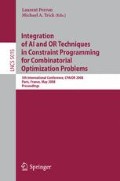Abstract
Mixed Integer Programs are a class of optimization problems which have a vast range of applications in engineering, business, science, health care, and other areas. For many applications, however, problems of realistic size can take a an impractical amount of time to solve on a single workstation. However, using parallel computing resources to solve MIP is difficult, as parallelizing the standard branch-and-bound framework presents an array of challenges. In this paper we present a novel framework called a Parallel Macro Partitioning (PMaP) framework for solving mixed integer programs in parallel. The framework exploit ideas from modern MIP heuristics to partition the problem at a high-level into MIP subproblems, each of which can be solved on a separate processor by an MIP algorithm. Initial computational resources suggest that PMaP has significant promise as a framework capable of bringing many processors to bear effectively on difficult problems.
Access this chapter
Tax calculation will be finalised at checkout
Purchases are for personal use only
Preview
Unable to display preview. Download preview PDF.
References
Coin-or project, https://projects.coin-or.org/Cbc
CPLEX. CPLEX User’s Manual. CPLEX: a division of ILOG, Version 10 (2005)
Danna, E., Rothberg, E., Le Pape, C.: Exploring relaxation induced neighborhoods to improve MIP solutions. Mathematical Programming Series A 102, 71–90 (2005)
Gendron, B., Crainic, T.G.: Parallel brach-and-bound algorithms: Survey and synthesis. Operations Research 42, 1042–1066 (1994)
Ladányi, L., Ralphs, T.K., Trotter Jr., L.E.: Branch, cut, and price: Sequential and parallel. In: Jünger, M., Naddef, D. (eds.) Computational Combinatorial Optimization. LNCS, vol. 2241, pp. 223–260. Springer, Heidelberg (2001)
Nemhauser, G.L., Savelsbergh, M.W.P., Sigismondi, G.: Functional description of MINTO, a mixed integer optimizer. Operations Research Letters 15, 47–58 (1994)
Dash Optimization. Xpress optimizer (2008), http://www.dashoptimization.com/
Ralphs, T.K., Ladanyi, L., Saltzman, M.J.: Parallel branch, cut, and price for large-scale discrete optimization. Mathematical Programming 98, 253–280 (2003)
Rothberg, E.: Exploring relaxation induced neighborhoods to improve MIP solutions. INFORMS Journal on Computing 19, 1060–0189 (2007)
Author information
Authors and Affiliations
Editor information
Rights and permissions
Copyright information
© 2008 Springer-Verlag Berlin Heidelberg
About this paper
Cite this paper
Namazifar, M., Miller, A.J. (2008). A Parallel Macro Partitioning Framework for Solving Mixed Integer Programs. In: Perron, L., Trick, M.A. (eds) Integration of AI and OR Techniques in Constraint Programming for Combinatorial Optimization Problems. CPAIOR 2008. Lecture Notes in Computer Science, vol 5015. Springer, Berlin, Heidelberg. https://doi.org/10.1007/978-3-540-68155-7_35
Download citation
DOI: https://doi.org/10.1007/978-3-540-68155-7_35
Publisher Name: Springer, Berlin, Heidelberg
Print ISBN: 978-3-540-68154-0
Online ISBN: 978-3-540-68155-7
eBook Packages: Computer ScienceComputer Science (R0)

